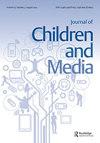The collective challenges of color, COVID-19, and their convergence
IF 2.1
3区 心理学
Q2 COMMUNICATION
引用次数: 2
Abstract
There are numerous challenges many of us must confront, including COVID-19 and expansive, global anti-Blackness, that often results in far-reaching consequences for Black individuals worldwide (Bledsoe & Wright, 2019). As a parent of two young Black boys, I worry about these issues influencing my children’s emotional health and physical safety. I value my role as a parent, and as a Black person, partner, researcher, teacher, and activist, these identities cannot be compartmentalized. I pursue grants, conduct research, and teach amid continued trauma. Yet, how does one concentrate on scholarship and protect their children from the pandemic, racial resentment, and the potential of media’s representation of both, which may create concern among young audiences? I offer my narrative as a Black media scholar, adopting the feminist intellectual traditions of standpoint theory (Hartsock, 1983), acknowledging the struggle to be seen, heard, and represented in a society that historically erases the hardships Black folks often face. To offer an illustration of those circumstances, on day two of my six and eight-year-old heading back to elementary school, after seven weeks of at-home virtual learning, my son said, “Daddy, I don’t think the Coronavirus is real.” Hearing my son say this broke my heart; I believe in science and work alongside multiple organizations to research the virus and its impact on Black Communities. My family has numerous friends and family members, all Black, who have contracted the virus, and some have died. At that moment in the car, I turned off the Frozen soundtrack to discuss his statement. My son shared that he overheard that the Coronavirus was fake while listening to news programs, confusing him. I know my children are tired of isolation, and now they see their friends and teachers in person and question why they had to spend months indoors. At that moment, I realized that the media contributed to my child questioning the existence of COVID-19. Sadly, my children did not know their father recently overcame the virus. To protect them, I mentioned that I was exhausted and needed to rest in solitude. I work extremely hard to safeguard my children from the structural inequalities Black people face due to their racial identity. Currently, COVID-19 highlights those disparities, and we are dying at alarming rates (Center for Disease Control, 2020). It pains me that often news programs encourage a narrative of seemingly impartial storytelling, framing the pandemic and the deniers of its reality as “newsworthy.” Likewise, scholars note news media’s role in uneven颜色、COVID-19的集体挑战及其融合
我们许多人必须面对许多挑战,包括COVID-19和广泛的全球反黑人,这往往会对全世界的黑人产生深远的影响(Bledsoe & Wright, 2019)。作为两个黑人男孩的父母,我担心这些问题会影响我孩子的心理健康和身体安全。我重视我作为一个父母的角色,作为一个黑人、伴侣、研究者、老师和活动家,这些身份是不能划分的。我在持续的创伤中寻求资助,进行研究和教学。然而,一个人如何专注于学业,并保护自己的孩子免受流行病、种族怨恨以及媒体对这两者的潜在表现的影响,这可能会引起年轻观众的关注?作为一名黑人媒体学者,我采用立场理论的女权主义知识传统(哈特索克,1983年)来叙述我的故事,承认在一个历史上抹去了黑人经常面临的苦难的社会中,被看到、被听到和被代表的斗争。为了说明这些情况,在我六岁和八岁的孩子回到小学的第二天,经过七周的在家虚拟学习,我的儿子说:“爸爸,我不认为冠状病毒是真的。”听到儿子这么说,我的心都碎了;我相信科学,并与多个组织合作研究这种病毒及其对黑人社区的影响。我家有很多朋友和家人都是黑人,他们都感染了这种病毒,有些人已经死了。在车里的那一刻,我关掉了《冰雪奇缘》的原声,讨论他的声明。我儿子说,他在听新闻节目时无意中听到冠状病毒是假的,这让他很困惑。我知道我的孩子们已经厌倦了与世隔绝的生活,现在他们见到自己的朋友和老师时,会质疑自己为什么要在室内待上几个月。那一刻,我意识到媒体助长了我的孩子质疑COVID-19的存在。可悲的是,我的孩子们不知道他们的父亲最近战胜了病毒。为了保护他们,我提到我很累,需要一个人休息。我非常努力地工作,以保护我的孩子免受黑人因种族身份而面临的结构性不平等。目前,COVID-19凸显了这些差距,我们正在以惊人的速度死亡(疾病控制中心,2020年)。令我痛心的是,新闻节目经常鼓励一种看似公正的叙事,将疫情和否认其现实的人视为“有新闻价值”。同样,学者们注意到新闻媒体在不平衡中的作用
本文章由计算机程序翻译,如有差异,请以英文原文为准。
求助全文
约1分钟内获得全文
求助全文

 求助内容:
求助内容: 应助结果提醒方式:
应助结果提醒方式:


